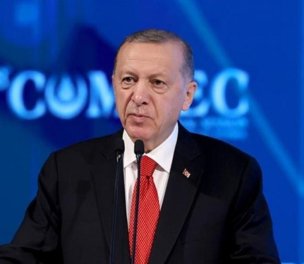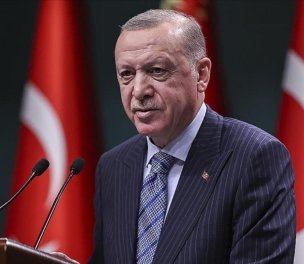İYİ Party may support 'headscarf' amendment to Constitution

Photo: AA/File
The İYİ (Good) Party tends to support the ruling party's proposal for a constitutional amendment regarding women's right to wear a headscarf, the party's spokesperson has announced.
"In this text, there are some expressions that we consider risky and that we think will cause problems in the future. These need to be changed. However, the tendency of the majority is 'yes'," Kürşat Zorlu told reporters on Monday (December 12).
The ruling Justice and Development Party (AKP) on December 9 submitted the proposal to the parliament. It amends article 24 about freedom of religion and conscience, adding provisions that benefiting from services provided by the public or private sector cannot be made conditional on a woman's head being covered or uncovered.
It also says women cannot be deprived of any rights for what they choose to wear because of their religious beliefs.
It was Kemal Kılıçdaroğlu, leader of the main opposition Republican People's Party (CHP), who first brought up the issue, promising legal protection for women's right to wear a headscarf. The party submitted a bill on October 4.
In response to the CHP's move, President and AKP Chair Recep Tayyip Erdoğan had suggested a constitutional amendment, saying, "We should turn this assist into a goal."
The AKP's proposal also includes the provision that a marriage can only be between a man and a woman.
CLICK - AKP to outbid opposition's 'headscarf bill' to propose amendment to Constitution
"Our nation actually wants a solution [to the economic crisis] but, unfortunately, the Republican People's Party brought this issue to the agenda," said Zorlu. "Then the AKP turned this into a constitutional amendment proposal."
However, the İYİ Party's support may prove crucial for the ruling alliance to get enough votes to hold a referendum for the amendment.
The Constitution can be amended by a two-thirds vote in the parliament. If the proposal gets a three-fifths vote, a referendum is held. Currently, the AKP and its ally, the Nationalist Movement Party (MHP) don't have enough seats to bring the proposal to a referendum.
About the headscarf issueAfter the 1980 coup d'état, the military government issued a series of regulations banning women in the public sector and students in non-tertiary education from covering their heads. In the 1990s, the ban was expanded to university students, which led to widespread protests across the country. In 1999, Merve Kavakçı, who was elected an MP from the Virtue (Fazilet) Party, an Islamist predecessor of Erdoğan's AKP, was prevented from taking oath in the parliament for violating the parliament's internal regulations. When the AKP nominated then-Foreign Minister Abdullah Gül for the presidency in 2007, her spouse, Hayrünnisa Gül, being a veiled woman was at the center of the debate, with the critics arguing that it would be against the principle of secularism in the Constitution. Gül was eventually elected the president after the Nationalist Movement Party (MHP) decided to support the AKP. In the following years, the AKP gradually lifted the headscarf ban with a series of laws and regulations. Following a 2008 law, university students eventually became free to wear headscarves, despite the initial resistance from the Higher Education Council and some universities to implement the law. After the parliament passed a "democratization package" in October 2013, four of its MPs attended the parliament's General Assembly wearing headscarves. Lawyers and teachers were also allowed to wear a headscarf with the same package. After the June 2015 elections, Lütfiye Selva Çam of the AKP became Türkiye's first veiled MP to take oath in the parliament. The first judge with a headscarf was appointed following the elections in November 2015. The police and the army allowed their women personnel to wear headscarves in 2016 and 2017, respectively. Currently, there is no restriction on headscarves in the public sector. |
(VK)






